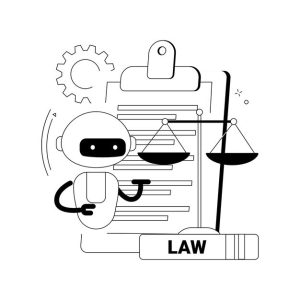Artificial intelligence (AI) has grown into a revolutionary agent in the legal profession as technology continues to halt and advance the world of professional work. Estate planning is one field where the digitization process is vastly improving and platforms like AI Law gpt are automating tasks that are conventionally manual such as the drafting of documents through the application of AI. Regarding clients: A large part of an attorney/legal professional competency is the ability to achieve a high level of accuracy, speed and client satisfaction. Integrating AI into the day to day experience of an attorney is no longer a vision of the future, it is a competitive edge in the present.
1. The emergence of AI in the field of law
AI is quickly being redefined on the way legal industries are able to conduct their workload especially on difficult tasks that are tedious and document loaded. A recent study carried out by the American Bar Association established that approximately 60 percent of law firms currently implement some type of AI. Most of these companies have recorded significant productivity growth and more attention on high value relationships with clients. Maybe the most important in the same survey 88% of the legal professionals ranked contract and document drafting as the top use case of generative AI (GenAI) applications.
In estate planning (where a variety of detailed legal documents are drawn up) this transformation can be especially appropriate. With AI such as AI Law gpt being used, attorneys can now automatically and Speed up creation of important estate documents- leaving them to concentrate on counseling their customers, settlement of disputes as well as strategic planning.
2. Artificial Intelligence in Document Drafting: Accuracy & Efficiency
Estate planning entails meticulous drafting of legal documents which should be in accordance with state regulations and at the same time fulfil the specific instructions of customers. These include:
Wills
The last will and testament is one of the foundation points of estate planning. AI Law gpt also assists lawyers in coming up with legally valid wills, as it assists in the input gathering, selection of the relevant laws to use, as well as structure the final report in such a way that Confusions and inconsistencies are avoided.
Trusts
Trusts are very complicated and intricate tools, which must be described using proper legal terminology in order to be valid and practical. AI platforms have the capacity to create customized trust documents by cross-referencing the language and clauses to each client’s monetary situation and aims.
Living Wills
Living wills (or rather advance directives) indicate the wishes of a client regarding medical treatment in case they are Disabled.With AI Law gpt, such documents will be able to match with the laws of the jurisdiction and will be written in a language that a healthcare provider can understand.
Powers of Attorneys
Writing a power of attorney to another individual, either durable or financial, should be done carefully. Machine learning software contributes to the development of such documents by providing prompts to enter crucial information and ensuring that a statutory criteria is met in order to have a legally acceptable standing.
Healthcare Directives
Just like the living wills, healthcare Directives demand a sensitive decision-making process. With the help of the AI-generated templates, attorneys can be kept on the right path to construct well-documented and legally compliant preferences of healthcare that are clearly expressed regarding their clients.
Provision of automated checks on completeness, legal understanding, and consistency in every underpinning through AI Law gpt reduces the human error and the time required to draft dramatically.
3. The landscape of estate planning will be a changed one as a result of AI Law gpt.
AI Law gpt does not just give templates. Its toolset can be described as an all-inclusive solution and combines data analysis, natural language processing (NLP) and intelligent document automation. These are some of the ways that it is revolutionising the world of estate planning:
Automatic Data Extraction
Collection and review of client information is one of the most time consuming processes of estate planning. With automated data extraction, AI Law gpt can extract pertinent detail on intake forms, financial statements and past legal documents. It saves time, as well as, it minimizes the likelihood of oversight.
NLP- Natural Language Processing
Through NLP, AI Law gpt will be able to make sense of difficult legal jargon and narrate it into ordinary English- which will be useful to both the drafter of the law and the client. It also aids the system in making sure that what the clients input is well understood and bears the final translation in the documents to be handed to them.
Finding Patterns and Understanding Legal Issues
With the help of thousands of similar cases, AI Law gpt will be able to see any patterns and will not miss the opportunities to see them. It could be the ability to add a missed clause or propose a different structure on standard practice, and such predictive ability boosts document integrity.
Quality Control and Legal Compliance
AI Law gpt warns about the lack of required aspects in law or contradictions, making attorneys adherent to the local and the federal regulation. This way, it reduces liability and shields the law firm as well as its clients.
Increased Efficiency
Automatic execution of routine processes frees the estate planners with time that they can use on other elements of strategy that involves more time with the clients and overall improvement in the aspect of delivering the estate plan services.
4. Constrains of AI Law gpt
Although AI tools are strong, they are not always accurate. One of the widely known concerns of AI-generated content is the risk of hallucinations. It is inaccurate or fabricated information that might still seem very convincing, although legally it has no basis. Because of it, AI Law gpt should be seen as an assistant rather than a substitute to human control. It is important to keep an eye on all documents, check the applied legal logic, and make legal work more consistent, smarter, and easier.(legal professionals).
Also, the training data of AI platforms is one of its limitations. State-specific details of estate law, recent changes in the law, and unusual client situations will not always be detected. In this manner, AI cannot and must not replace legal skills and decision making, but rather complement it.
5. Conclusion: More Agile More Smarter Practice
AI Law gpt is the next great improvement in the estate planning industry with the goal of providing better service to clients as it increases workload. Since it automates document drafting, analyzes legal patterns, and provides superior levels of accuracy, it allows the lawyer to concentrate on what he or she does best, which is to provide specially tailored legal advice and form lasting relationships with clients.
There is more to acceptability of the use of such tools as AI Law gpt as something convenient or comfortable, but it is a strategic decision to align with the way of legal profession that evolved into digital. The first companies that invest in AI technologies will get efficiency of operations, less risk and better competitive positioning.
Independent practitioners or one of large estate planning firms alike, the key to future proofing your practice might be to incorporate AI into your practice. Use AI Law gpt potential and enjoy the rapid, intelligent and safe legal services you will deliver in the new age of the legal system.
Want to restructure your estate planning practice?Join AI Law GPT today and experience the future of working with legal documents.










